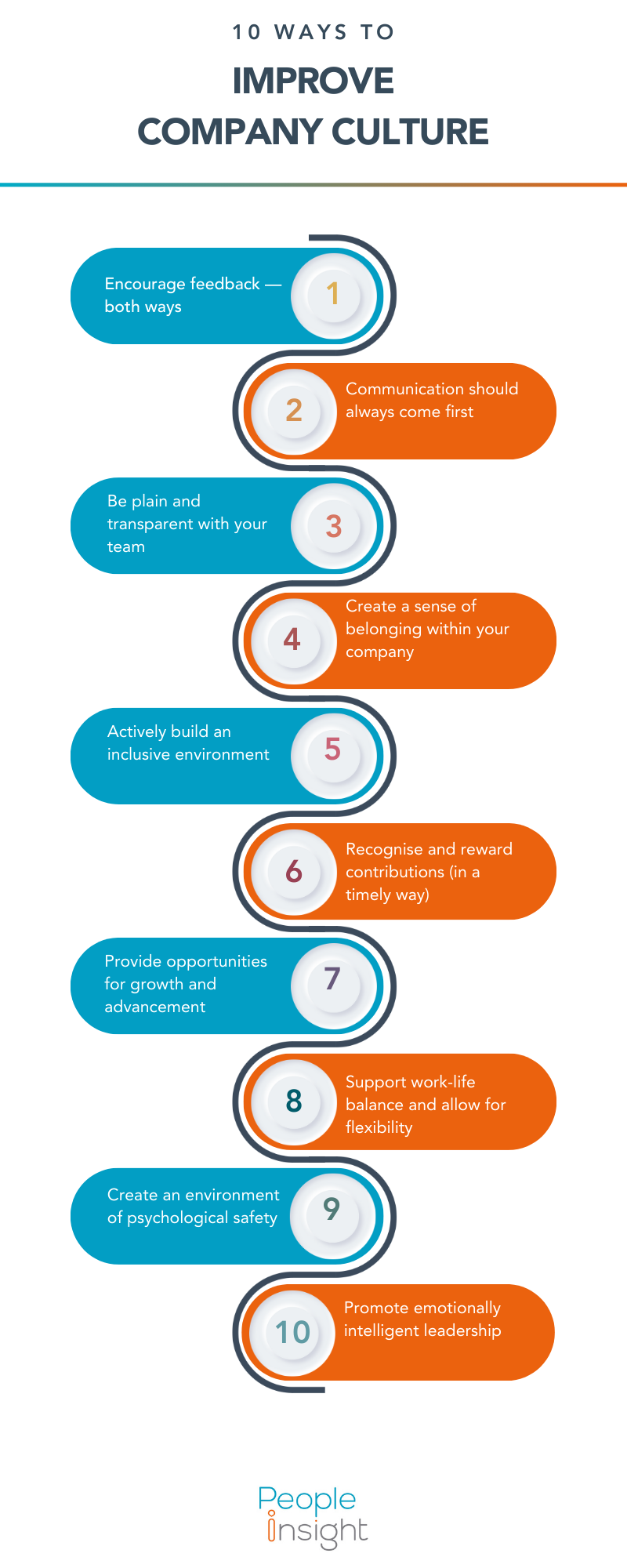
A quick insight: Improving company culture means focusing on shared values, open communication and consistent leadership behaviour. This blog outlines multiple ways organisations can evolve their culture to support trust, engagement and long-term success. It gives practical steps to strengthen identity and unity at work.
A strong company culture doesn’t happen by accident. It’s shaped by leadership, communication and the everyday experiences of your employees. A workplace with a positive culture benefits from higher productivity, lower turnover and greater levels of employee engagement. In contrast, a weak or toxic culture leads to disengagement, poor performance and retention issues..
So, how do you improve company culture in a way that makes a lasting impact? While culture is influenced by many factors, businesses can take proactive steps to create an environment where employees feel valued, heard and motivated.
Related: What is organisational culture? (Discover yours in our quiz!)

We gathered our top HR consultants, who came up with ten tried-and-tested strategies that can help build a workplace where people thrive..
Company culture improves when employees feel their voices matter. If employees don’t believe their opinions are valued, they are less likely to engage, share ideas or feel invested in the company’s success. Organisations that listen to employee feedback — and act on it — see higher levels of engagement and, generally, wellbeing.
But it’s worth noting that a healthy culture of feedback should go both ways. Employees should feel comfortable raising concerns or making suggestions, but managers also need to provide regular, constructive feedback. Employees don’t want to work blind — they want to know what they’re doing well, what they’re doing wrong and why. They need assistance and guidance if they are to improve — and the end result is a more engaged, dedicated employee who is better equipped to move your company forward.
Encouraging feedback helps to build trust between leadership and employees, creating a workplace where people feel heard and respected.
Poor communication can lead to misunderstandings, uncertainty and disengagement. On the other hand, companies with effective communication have been shown to be 3.5 times more likely to outperform their competitors.
Employees need to understand the company’s mission, your organisation’s values and your overarching goals to feel truly aligned with the organisation. When communication is clear, employees can see how their work contributes to the bigger picture.
Regular town halls, leadership updates and transparent discussions about business changes, challenges and wins all help to build trust.
Businesses should also focus on two-way communication, where employees can share their thoughts and receive honest updates about company decisions. This level of openness helps to strengthen relationships between leadership and employees.
Holding back information might seem innocuous at times, but in reality, such behaviour can create a divide between leadership and employees. When employees are left in the dark about company decisions or performance, they may well end up feeling undervalued or even distrustful of management.
Instead of operating on a ‘need-to-know’ basis, businesses should aim for transparency. Sharing updates on company performance, strategic goals and decision-making processes helps employees feel more invested in the organisation’s success.
Transparency also encourages accountability. When leadership openly discusses challenges or mistakes, employees are more likely to trust the organisation and contribute to problem-solving efforts.
Employees who feel like they belong in a company are more likely to be engaged, motivated and committed to their work. We also know that employees with a strong sense of belonging are 56% more productive. A workplace culture that promotes belonging recognises employees for their contributions, encourages social connections and actively works to eliminate exclusion.
Creating a sense of belonging involves recognising individual contributions, celebrating diversity and making sure that all employees feel included in company decisions and activities — and don’t forget the social aspect of work! Watercooler conversations can create really tight bonds for employees, and company socials can go a long way to building long-lasting relationships at work.
Related: Company culture and employee engagement: why you need both
Diversity and inclusion go beyond hiring policies. They influence everything from day-to-day interactions to leadership decisions. Research has shown that diverse teams outperform less diverse ones by 35%. Companies that embrace diversity benefit from increased innovation, creativity and problem-solving abilities.
Building an inclusive environment means making sure all employees have equal opportunities to contribute, develop and progress within the organisation. This includes removing barriers to advancement, addressing unconscious bias and actively promoting inclusion in leadership roles.
Read further: Creating a culture at work: 4 mistakes that will tank your business
People want to know that their work is appreciated. When employees feel that their efforts are recognised, they are more likely to stay engaged and motivated. Recognition doesn’t always have to be financial, though — there are plenty of non-financial incentives that work just as well. Simple gestures like public praise, personalised rewards or additional responsibilities can be incredibly effective.
Employees are more engaged when they see a future in their company. Offering career development opportunities (whether through mentoring, skills training or leadership programmes) helps employees feel valued and motivated.
Providing access to learning and development opportunities also benefits the company by increasing internal talent and reducing the need for external hiring.
Burnout is a growing concern for companies in the UK and globally, with employees facing increasing workloads and workplace stress. Companies that promote flexible working arrangements, reasonable workloads and respect for personal time create a healthier work environment.
Work-life balance improves not only employee wellbeing but also productivity, as employees who feel rested and supported are more effective in their roles.
Employees should feel comfortable speaking up, sharing ideas and admitting mistakes without fear of criticism or unreasonable consequences. Psychological safety encourages innovation and collaboration by creating a culture where people are not afraid to take risks.
Google’s internal research found that the highest-performing teams share a culture of psychological safety, where employees feel safe to express their thoughts and contribute freely. When employees feel secure in their roles, they are more likely to engage in problem-solving and creative thinking.
Leaders play a key role in shaping company culture. Leaders with high emotional intelligence — who show empathy, self-awareness and strong interpersonal skills — build stronger relationships with employees.
Investing in leadership development and training can help managers build the skills needed to lead with empathy and authenticity.
Improving company culture is all about creating an environment where employees feel valued, heard and motivated to do their best work. Companies that invest in clear communication, employee development and inclusive leadership inevitably see measurable benefits in productivity, engagement and retention. Undergoing organisational change in order to obtain the company culture you want isn’t always quick or easy — but small steps in the right direction ultimately benefit employees, managers and the company at large.
Understanding company culture starts with listening. Employee surveys provide insights that can guide meaningful cultural improvements. Get in touch to learn how our employee surveys can help you build a stronger workplace culture — and find out how our cultural assessment and alignment services can shape your company’s future.
